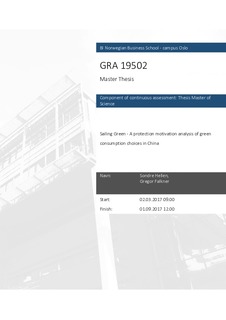Sailing green : a protection motivation analysis of green consumption choices in China
Abstract
Many Chinese consumers experience environmental problems like air and water
pollution first-hand - does that lead them to making greener consumption choices?
We aim to show the suitability of Protection Motivation Theory for such
environmental research and to increase the understanding of how Chinese
consumers perceive green product attributes. In particular, this research examines
Chinese consumers’ perception of threat and coping mechanisms regarding
environmental threats and investigates their predictive power for intention and
behavior to make green consumption choices. In co-operation with the Norwegian
cruise company Hurtigruten, a conjoint analysis measures the relevance and actual
price tag consumers put on green product attributes in a choice-situation with
multiple product attributes. We find high levels of intention to engage in
environmentally friendly behavior, but those intentions translate into green
consumption choices only for a minority of consumers. For the majority, there
exists a significant Value-Action Gap, especially when green choices involve
negative tradeoffs on other attributes. For 43% of respondents in our sample, the
gap from intention to behavior does not narrow even when they perceive an
environmental threat as a both real and solvable. Companies marketing green
products should pay attention to segmentation as some consumers expect
substantial price premiums and others expect discounts for green product attributes.
For public policy makers, our results suggest that consumer behavior does not
change, and demand for green products does not grow, all by itself. To encourage
such change, future campaigns should aim at modifying perceptions of green
product attributes rather than increasing behavioral intention or knowledge about a
threat.
Description
Masteroppgave(MSc) in Master of Science in Strategic Marketing Management - Handelshøyskolen BI, 2017
